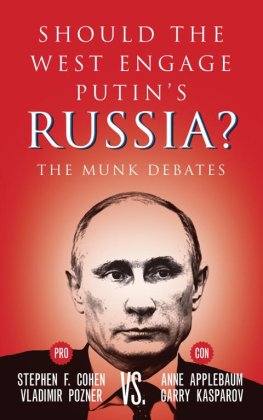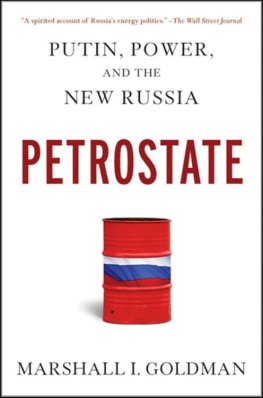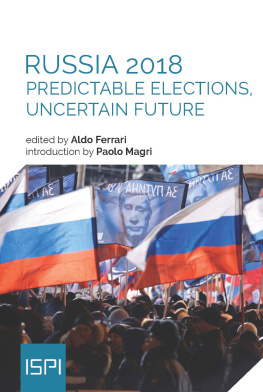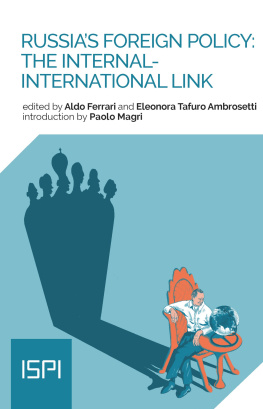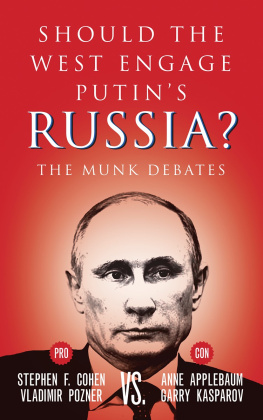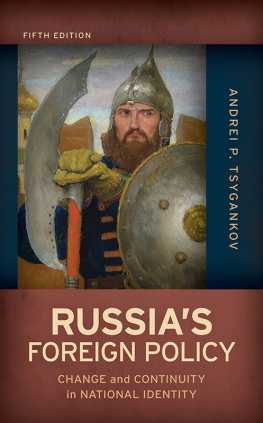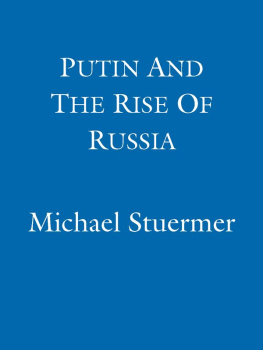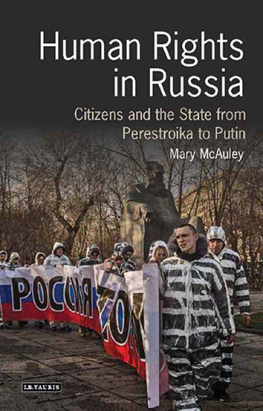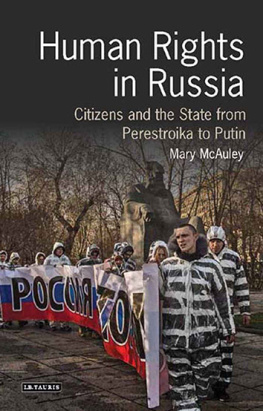About the Contributors
Alfred B. Evans Jr., professor emeritus of political science at California State University, Fresno. He is the author of Soviet Marxism-Leninism: The Decline of an Ideology (1993). He is also editor or coeditor of three books, including Change and Continuity in Russian Civil Society: A Critical Assessment (2006). He has published many book chapters and articles in scholarly journals. His current research focuses on civil society in Russia, with particular emphasis on organizations that engage in public protests.
Kathleen J. Hancock, associate professor of political science at the Colorado School of Mines. Her book Regional Integration: Choosing Plutocracy compares Eurasian economic integration with regionalism in southern Africa and 1800s Europe. In that book and related articles, she argues that oil and gas pipelines, electricity grids, and other energy infrastructure play critical roles in determining political relationships. Hancock is on the editorial board for the journal Energy Research & Social Science, where she has been instrumental in developing the international political economy of energy. In 20152016, she will be a fellow at the Freie Universitt in Berlin, working on a book project: Energy Regionalism: How Energy Resources Create, Maintain, and Divide World Regions.
Timothy Heleniak, research professor in the Department of Geography at George Washington University. He has researched and written extensively on demographic trends, migration, and regional development in Russia and the other countries of the former Soviet Union. He previously worked at the US Census Bureau, the World Bank, and UNICEF, and is currently researching migration and sustainable development in the Arctic with support from a National Science Foundation grant. He is the editor of the journal Polar Geography.
Kathryn Hendley, William Voss-Bascom Professor of Law and Political Science at the University of Wisconsin, Madison. Her research focuses on legal and economic reform in the former Soviet Union and on how law is actually experienced and used in Russia. Her research has been supported by grants from the National Science Foundation, the Social Science Research Council, the National Council for Eurasian and East European Research, and the International Research and Exchanges Board. She has been a visiting fellow at the Woodrow Wilson Center, the Kellogg Institute for International Affairs at Notre Dame University, the Russian Economic School (Moscow), and the Program in Law and Public Affairs at Princeton University. She has published widely in journals such as Post-Soviet Affairs, Law and Social Inquiry, and the American Journal of Comparative Law.
Dale R. Herspring, University Distinguished Professor of Political Science at Kansas State University, is a member of the Council on Foreign Relations. He is the author of twelve books and more than eighty articles dealing with Russian/Soviet, US, German, and Polish national security affairs. His most recent books include The Kremlin and the High Command: Presidential Impact on the Russian Military from Gorbachev to Putin (2006); Rumsfelds Wars: The Arrogance of Power (2008); and a forthcoming book titled Military Culture and Civil-Military Relations: The American, Canadian, German and Russian Cases.
Janet Elise Johnson, associate professor of political science and womens studies at Brooklyn College, City University of New York. She is the author of Gender Violence in Russia: The Politics of Feminist Intervention (2009) and a coeditor of Living Gender after Communism (2007). Over her career, she has been affiliated at various Russian studies institutes, including at Indiana, Miami, and Columbia Universities as well as the University of Helsinki. She writes extensively on gender and politics in Russia.
Taylor Ren Lane, candidate for Master of International Political Economy of Resources at the Colorado School of Mines. Lane holds a bachelors degree in Russian Studies from the University of Colorado at Boulder and studied the Russian language as a US Department of State Critical Language Scholar. She has experience analyzing energy issues in Russia and Azerbaijan, and previously worked in the commodities division at Morgan Stanley. Presently, her research focuses on developments between nationally owned petroleum companies and private corporations in Eurasia and in other regions of the world.
Maria Lipman, visiting fellow at the European Council for Foreign Relations. She was the editor in chief of Pro et Contra, a policy journal published by the Carnegie Moscow Center from 2003 until 2014. Before joining Carnegie Moscow Center, Lipman was cofounder and deputy editor of two Russian weekly magazines: Itogi (Results), the first weekly news magazine in Russia, published in association with Newsweek, and Ezhenedelny Zhurnal (Weekly Journal). From 2001 until 2011 Lipman wrote an op-ed column on Russian politics, media and society for TheWashington Post. She has contributed to a variety of Russian and US publications, including The New Yorker and has written an online monthly blog for that magazine since 2012. She has contributed to and coedited several volumes on Russian politics and society. Lipman is a frequent speaker on the international conference circuit and is regularly featured as a Russia expert on a range of international broadcast media. She holds an MA from Moscow State University.
Jeffrey Mankoff, fellow and deputy director of the Russia and Eurasia Program at the Center for Strategic and International Studies. Previously he served as an adviser on Russian affairs at the Department of State. He has also been an adjunct fellow Council on Foreign Relations and associate director of International Security Studies at Yale University. He has held fellowships at Harvard, Yale, and Moscow State universities, and is the author of Russian Foreign Policy: The Return of Great Power Politics (2011). He has a PhD in diplomatic history from Yale.
Alexander M. Nikulin, Dr. of Economics, director of the Center for Agrarian Studies, Russian Presidential Academy of National Economy and Public Administration (RANEPA). He is the author or coauthor of several books on the rural sociology and agrarian history of Russia. He has published numerous articles and book chapters in a wide range of journals and books. His research has been supported by the Open Society Institute, MacArthur Foundation, Russian State Scientific Foundation, Rosa Luxemburg Foundation, INTAS, OXFAM, and the World Bank. His recent books include Peasant Life Practices: Russia 19912012 (2013) and Agrarians, Power and Countryside: From Past to Present (2014).
Alexandra Novitskaya, PhD student in women and gender studies at Stony Brook University, State University of New York. She received her BA and MA in philosophy from St. Petersburg State University and has been involved in LGBT activism in St. Petersburg since 2010. Her research interests include European womens movements in the nineteenth century, Russian feminism, and LGBT activism as well as nationalism and propaganda in the twenty-first century Russia.
Nikolai Petrov, professor at Higher School of Economics, Moscow. For many years he was scholar in residence at the Carnegie Moscow Center where he directed the Society and Regions project. He also heads the Center for Political-Geographic Research. Petrov is a columnist for the The Moscow Times, a member of the Program on New Approaches to Research and Security in Eurasia (PONARS Eurasia), and a member of scientific boards of the Journal of Power Institutions in Post-Soviet Societies and of



